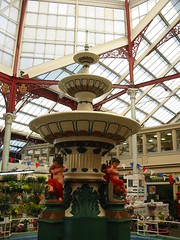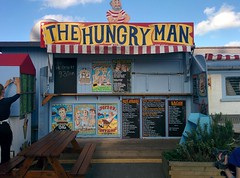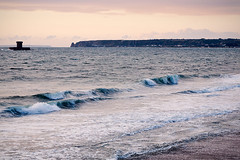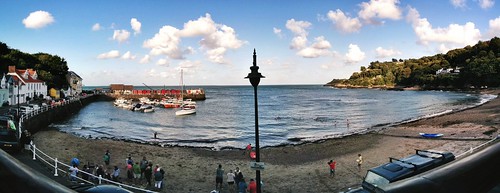Fed up with rainy Britain? Want to get some French sun, but can’t face coping with the language and the roads? Feeling flush enough to spend some time in one of the playgrounds of the rich? Jersey may be for you.
We had a ten day camping holiday on Jersey in August this year, and returned home eager to save up for another one in a few years’ time. The weather wasn’t uniformly glorious, although there were several extremely good days, but even in the unsettled conditions following the recent Hurricane Bertha, it remained mild.
Getting there
You can fly or sail; we paid the supplements to take our car - a Zafira with roof box - on the Condor ferry. Our original plan had been to take the fast boat across from Poole during the first morning and return on the slow sailing overnight to Weymouth on the Saturday a week and a half later, in a cabin. Unfortunately, two weeks before our trip, one of Condor’s boats grounded and was withdrawn from service, meaning that our return trip was cancelled and substituted with a fast overnight sailing that offered no cabins. As we had two young children and had planned for everyone to get some sleep, this was less than ideal but we worked around it in the end.
Also note that during the Jersey-Weymouth crossing on the Saturday immediately after our arrival, in the tail end of Bertha, 41 vehicles were damaged due to the rough seas. Neither of these events appear to be typical, but they are a possibility to bear in mind.
That apart, Condor’s handling of the ferry loading and crossing were exemplary. Although four hours in a noisy passenger lounge (with most of the disturbance coming from a school party on the way over and a rugby team on the return) would not be my ideal way to travel, some decent media on your phones and tablets for the family makes it tolerable. Note: there is no wifi on board and obviously, no 3G in the middle of the Channel.
Staying there
 Camping on Jersey is only allowed on official sites, of which there are
two, both located in the north-east corner of the island. (A third, which
was conveniently in the opposite corner, closed in 2010.) While this may
make them seem slightly remote, anywhere else in Jersey can be reached
well within an hour by car.
Camping on Jersey is only allowed on official sites, of which there are
two, both located in the north-east corner of the island. (A third, which
was conveniently in the opposite corner, closed in 2010.) While this may
make them seem slightly remote, anywhere else in Jersey can be reached
well within an hour by car.
We stayed at Rozel Camping Park, which can accommodate tents, motorhomes and caravans, and offers a number of pre-pitched tents with all equipment provided. To keep the budget down, we took our own tent - a Vango Tigris 6 plus porch, which occupied most of our alloted pitch. Electricity was provided, and wifi, which was good when it worked, was available near the site shop. Rozel offers a small shop open twice daily and stocked with essentials, including fresh bread and cakes every morning, an unheated swimming pool, two shower blocks that were acceptably clean and well-provisioned, a limited games room (pool tables, foozball, air hockey, mostly working), an undersized laundry room, a small crazy golf course and a TV room. It was pleasantly situated and perfectly comfortable for a stay of our duration but will not detain you from seeking out more interesting activities elsewhere.
Hotel and self-catering accommodation are also available, at a price. Jersey’s attitude to the cheap package holiday is best illustrated by the derelict remnants of the Pontin’s holiday camp at the cliffs on Plémont Bay (the site has now been purchased by the National Trust, who will shortly demolish the buildings and allow the site to return to nature).
A note on connectivity: free wifi is usually offered in cafés, restaurants and tourist attractions but often proved to be unreliable, flaky or plain broken. 3G service approximates that of the UK and the main mobile operator is Jersey Telecom. Note that Giffgaff (my own operator) does not cover Jersey on its standard tariff and additional credit must be purchased to allow EU roaming at an eye-watering 19p per MB.
Getting around
 Assuming you take your own car or hire one, Jersey offers a pleasant,
even slightly old-fashioned driving experience. The blanket 40mph maximum
speed restriction makes for relaxed motoring, but the limited road space
and occasional blind corner or junction will force you to stay alert.
Jersey has some of the narrowest roads in the British Isles, yet the
Islanders often favour the widest cars available; Audis, BMWs and Mercedes
are frequently encountered, usually at one of the many pinch-points in the
road network. Additionally, many of the roads are enclosed on one or both
sides by high walls or hedges at various points, leaving little margin for
error. (It may not sound fast but you’ll soon be grateful for that forty
limit.) On some of the more restricted routes (e.g. the roads down to Rozel
Bay), coach traffic is restricted to morning hours only. The only section
of dual carriageway is the A2, which runs for a few miles along the coast
from St. Helier. Drivers in the main are courteous and non-aggressive, as
you might expect when nobody is going anywhere fast.
Assuming you take your own car or hire one, Jersey offers a pleasant,
even slightly old-fashioned driving experience. The blanket 40mph maximum
speed restriction makes for relaxed motoring, but the limited road space
and occasional blind corner or junction will force you to stay alert.
Jersey has some of the narrowest roads in the British Isles, yet the
Islanders often favour the widest cars available; Audis, BMWs and Mercedes
are frequently encountered, usually at one of the many pinch-points in the
road network. Additionally, many of the roads are enclosed on one or both
sides by high walls or hedges at various points, leaving little margin for
error. (It may not sound fast but you’ll soon be grateful for that forty
limit.) On some of the more restricted routes (e.g. the roads down to Rozel
Bay), coach traffic is restricted to morning hours only. The only section
of dual carriageway is the A2, which runs for a few miles along the coast
from St. Helier. Drivers in the main are courteous and non-aggressive, as
you might expect when nobody is going anywhere fast.
Parking charges are mainly paid via scratch card (‘paycards’). Books of these cards in various time denominations can be bought at most supermarkets and newsagents, or you can find unused cards sold on eBay; simply scratch off your arrival date and time on the correct number of cards to cover your intended stay. (This also makes it easy to extend your stay by adding more cards, assuming there is no upper limit.) In St. Helier, good parking is available next to the Esplanade and along the A2, but note the latter is closed for the week of the Battle of Flowers. Having a relatively high car with a roof box, we avoided any covered parking. Parking outside the main towns and villages is generally free.
Jersey also has an extensive public bus network, with all routes radiating from the capital, St. Helier. Buses generally run until 11pm, but beware that the last bus can be crowded. At special times, such as after the annual Battle of Flowers (a carnival and seafront parade with decorated floats), extra buses are provided.
Jersey’s last railway line closed in 1936, and the former trackbed can be walked or cycled, with cycle hire available at St. Helier and St. Aubin.
What it’s like
 Jersey was originally part of France, which explains the prevalence
of Gallic place names. Given its latitude, the climate and atmosphere
are decidedly French, but the culture and society are strongly English,
generally tending middle class and upwards. (Although there is some
unemployment and a low wage section of the economy, most of it appears to
be concentrated around St. Peter and the airport.) A tightly restricted
immigration policy (although less so for moneyed incomers) coupled with a
concentration on financial services and a recognised status as a tax haven
make the island an attractive home for high earners and wealthy retirees.
A cursory glance at some of the properties visible while driving around
indicate that there is a lot of money floating around Jersey, and this
only becomes more obvious as you come to know it better.
The main supermarket chain is Waitrose.
Jersey was originally part of France, which explains the prevalence
of Gallic place names. Given its latitude, the climate and atmosphere
are decidedly French, but the culture and society are strongly English,
generally tending middle class and upwards. (Although there is some
unemployment and a low wage section of the economy, most of it appears to
be concentrated around St. Peter and the airport.) A tightly restricted
immigration policy (although less so for moneyed incomers) coupled with a
concentration on financial services and a recognised status as a tax haven
make the island an attractive home for high earners and wealthy retirees.
A cursory glance at some of the properties visible while driving around
indicate that there is a lot of money floating around Jersey, and this
only becomes more obvious as you come to know it better.
The main supermarket chain is Waitrose.
Shopping
 Prices are markedly higher than in the UK. We never paid less than
twenty-five pounds for lunch and fifty for an evening meal out. Jersey
uses the UK’s currency but also issues its own banknotes and coins, which
are not legal tender on the mainland (although any UK bank will swap
it).
Prices are markedly higher than in the UK. We never paid less than
twenty-five pounds for lunch and fifty for an evening meal out. Jersey
uses the UK’s currency but also issues its own banknotes and coins, which
are not legal tender on the mainland (although any UK bank will swap
it).
Apart from Waitrose, the main grocery outlets are the Co-operative and smaller ‘discount’ shops such as the Food Hall at Five Oaks roundabout (which also sells some Waitrose product lines). Those used to the choice at large UK chains will find a much narrower range of goods, but most recognised household items can be obtained from the larger stores. Don’t expect the prices to match though.
Most of the well-known retail chains are located in St. Helier, the centre of which is pedestrianised. We did not spend much time here, although I did meet a man who was over from France for the shopping and for, as he noted, sights that were not common in his home country such as people carrying umbrellas.
There are a number of high-end, ‘exclusive’ gift and jewellery shops if you are seeking a particularly expensive souvenir of your visit.
Where to go
The northern and eastern coasts of Jersey are mainly rocky and rugged, while the western and southern sides are gentler and usually offer the best beaches. If planning a beach day, take note of the tide times as most of the sands disappear altogether at high tide.
St. Helier is the main town and port. The Cineworld complex on the front is ideal for a family evening out. Slightly further along, Le Jardins de la Mer offers a fun splash park for children and comfortable seats for adults with holiday reading, next to La Fregate café. Although free, the fountains are sometimes shut off during high winds. (Around the other side of the town, Havre des Pas has a beach and tidal bathing pool, but we did not have the opportunity to try this.)
 St Ouen’s Bay stretches along most of the western side of the island
and, while popular for its fine sandy beach and surfing, still has enough
space to provide solitude in which to enjoy the wide views and sea air. If
you have the time, an enjoyable day could be spent walking the entire
length; there are numerous places to stop for food and drink, including Le
Braye café which also offers an excellent evening menu.
St Ouen’s Bay stretches along most of the western side of the island
and, while popular for its fine sandy beach and surfing, still has enough
space to provide solitude in which to enjoy the wide views and sea air. If
you have the time, an enjoyable day could be spent walking the entire
length; there are numerous places to stop for food and drink, including Le
Braye café which also offers an excellent evening menu.
There are numerous small, secluded bays along the north coast, typically each with a basic but acceptable café or beach shack, including Plémont, Grève de Lecq, Bouley and Rozel. Larger beaches that cater well for holidaymakers and families can be found on the southern coast at St Brelade’s and Quaisné.
 Gorey is a small harbour village mainly noted for the impressive
castle of Mont Orgueil that stands over it. The castle is open to visitors
(with an admission charge) and has plenty to explore. There are several
restaurants along the harbourside, not to mention the most delightful
emporium of seaside tat and odds & ends.
Gorey is a small harbour village mainly noted for the impressive
castle of Mont Orgueil that stands over it. The castle is open to visitors
(with an admission charge) and has plenty to explore. There are several
restaurants along the harbourside, not to mention the most delightful
emporium of seaside tat and odds & ends.
Inland, the Durrell Wildlife Park is most likely unavoidable for those with children. The zoo is well laid out and, unlike some of the larger UK zoos, can be covered in a day without exhausting everyone. The headline attraction is the gorilla enclosure but there are plenty of other sights. The on-site cafés were sufficiently enticing for the family on our neighbouring pitch to return for lunch on a second day.
For a rainy or hot day, the Jersey War Tunnels allow you to take cover in a cool underground complex while learning about the Nazi occupation of the Island during WW2. The tunnels themselves were arguably of limited strategic value to the German army, so the exhibition wisely concentrates on the day to day implications of life under occupation. This is a powerful and thought-provoking experience, but young children are likely to struggle to absorb any relevance to them and may easily become bored by the end (ours had the audio guides; both lost interest within the first few rooms). (Churchill’s response to the notion of recapturing the Islands from the Germans following D-Day? “Let ‘em starve.”)
Families will also want to check out the Jersey ‘Living Legend Village’, which incorporates a multimedia historical presentation featuring some well-known actors (including Brian “GORDON’S ALIVE!” Blessed), an entertaining crazy golf course and, more prosaically, a craft and shopping outlet. Best experienced once, though perhaps not again. Other families on the campsite also spoke well of ‘aMaizin!’, an adventure park in the St. Peter parish, and suggested it was better value than Living Legend.
 If you prefer free attractions, watching the causeway at Corbiere
lighthouse as the tide comes in and a walk down to The Devil’s Hole at St.
Mary (during which you will pass a now slightly damaged statue of Old Nick
located amid a pond) are both worthwhile options. And of course, there’s
always the beach.
If you prefer free attractions, watching the causeway at Corbiere
lighthouse as the tide comes in and a walk down to The Devil’s Hole at St.
Mary (during which you will pass a now slightly damaged statue of Old Nick
located amid a pond) are both worthwhile options. And of course, there’s
always the beach.

